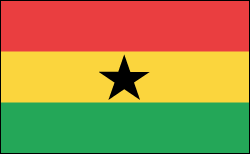Ghana History


Military Rule Gives Way to Civilian Government and Stability
A series of military coups followed, and on June 4, 1979, Flight Lt. Jerry Rawlings overthrew Lt. Gen. Frederick Akuffo's military rule. Rawlings permitted the election of a civilian president to go ahead as scheduled the following month, and Hilla Limann, candidate of the People's National Party, took office. Rawlings's three-month rule was one of Ghana's bloodiest periods, with executions of numerous government officials and business leaders. Two years later Rawlings staged another coup, charging the civilian government with corruption. As chairman of the Provisional National Defense Council, Rawlings scrapped the constitution, instituted an austerity program, and reduced budget deficits over the next decade. He then returned the country to civilian rule and won the presidency in multiparty elections in 1992 and again in 1996. Since then, Ghana has been widely viewed as one of Africa's most stable democracies. In Jan. 2001, John Agyekum Kufuor was elected president. In 2002, he set up a National Reconciliation Commission to review human rights abuses during the country's military rule. He was reelected in Dec. 2004.
In presidential elections in December 2008, Nana Akufo-Addo, of the governing New Patriotic Party, won just over 49% of the vote, and John Atta Mills, of the main opposition party, National Democratic Congress, took almost 48%. In the runoff election, necessary because neither candidate received 50% of the vote, Atta Mills eked out victory, with 50.23%. It was the closest election in Ghana's history.
President Atta died in July 2012. His four years in office were marked by stability and an increase in oil production. Vice President John Dramani Mahama was sworn in shortly after Atta's death. Mahama won the presidential election held in December, taking 50.7% of the vote. He prevailed over Nana Akufo-Addo of the New Patriotic Party.
See also Encyclopedia: Ghana .
U.S. State Dept. Country Notes: Ghana







